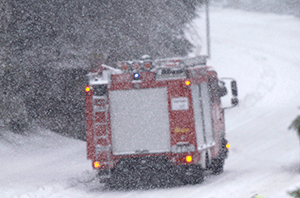 You’re part of a Fire District. You love your job. You love helping people when they are in distress. For you, there is no greater sense of pride than saving a life, a home or providing rescue assistance. You’ve been there for Superstorm Sandy and you’ve weathered countless nor’easters. Time after time, your department has responded, day and night.
You’re part of a Fire District. You love your job. You love helping people when they are in distress. For you, there is no greater sense of pride than saving a life, a home or providing rescue assistance. You’ve been there for Superstorm Sandy and you’ve weathered countless nor’easters. Time after time, your department has responded, day and night.
If you could think of one thing that enables you to report for duty, what would it be?
There are many great answers, but if you didn’t say “electricity,” you might be under-thinking your biggest ally in completing your mission.
Keeping the power on ensures that the phones ring, the computers work, first responders stay warm and dry, the garage doors open and close and equipment stays charged. But perhaps most important, the pumps in those diesel tanks turn on and fuel those trucks.
Relying on the power company and its transmission lines is risky when lives are at stake. A reliable, properly specified power generator could end up being the most vital piece of equipment at your fire house during a storm or other emergency.
But you already know this. That’s why you’re here. Now you’re looking for some answers on how to identify the right generator for your station. Here are some answers to a few common questions:
Q: What size unit do I need?
A: It depends on what you are trying to power. Obvious, yes, but the answer requires determining what is absolutely essential. Start by listing the critical pieces of equipment that use electricity. Then get in touch with a licensed engineer to help you perform an electrical load analysis.
Q: How does a backup generator work?
A: Typically, the generator is wired into the building’s electrical system through a generator transfer switch. When the switch senses a power outage, it isolates the essential electrical circuits–those that you designated when sizing the generator–and provides them with power. When normal power returns, the switch transfers power back to the utility source.
Q: Which fuel should I use?
A: Walden recommends bi-fuel generators (natural gas and diesel) because having that option is like having insurance for your insurance. Since it’s not unheard of for natural gas supplies to be interrupted in large storms, your on-site diesel tanks would provide a perfect self-sufficient backup for keeping the generator running.
Q: Diesel tanks? Don’t those have to be permitted?
A: Usually. You should contact your local municipality to find out their specific regulations.
Q: Are there known maintenance issues with diesel tanks that specifically serve generators?
A: The biggest issue we’ve encountered is that the diesel fuel may oxidize if stored for longer than 12 months. In those cases, we suggest adding a fuel stabilizer.
Q: If I decide to add tanks and a generator to my facility, what must I do to permit them?
A: Generally, each county has a department that handles tank installation and permitting. In Nassau County that department is the Department of Health, when diesel fuel is involved, and in Suffolk County that department is the Department of Health Bureau of Environmental Engineering. You will want to have a licensed engineer prepare drawings, seal, and stamp those drawings for submittal to the county department. For counties outside of Long Island, give Walden a call so we can help you navigate local regulations. Generators typically must be approved by the County Fire Marshall, but you should contact local authorities for specific rules.
Q: Who should I buy the generator from?
A: There are many companies that supply, install and service commercial generators. We recommend using a consultant familiar with bid documents, construction and generators to help write a proper bid and solicit the best firm for the job.
Q: Ok, we’ve decided to invest in a generator. What is the single greatest threat to our generator that we should plan for?
A: Lack of proper maintenance! You regularly wash trucks, run pumps, perform equipment checks and ensure that all equipment inside your fire house and on your trucks is functional. You should do the same with the generator. It must be regularly tested and serviced. A good test should simulate an actual power failure. In other words, the first time you fire up the generator should not be the first time you really need it. Treat it like the equipment on your trucks, and you’ll ensure that the entire system will be ready when the power goes out.
If you have any other questions, please call one of Walden’s experienced engineers to help you.
Stay healthy, and thank you for protecting us, no matter what the season!
